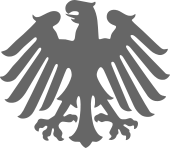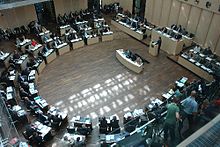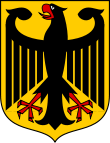- Bundesrat of Germany
-
German Bundesrat
Deutscher Bundesrat
Type Type States representation Leadership President of the Bundesrat Horst Seehofer, CSU
since November 1, 2011Members 69 Political groups Christian Democratic Union/Christian Social Union
Social Democratic Party
Free Democratic Party
The Left
Greens.Meeting place 
Preußisches Herrenhaus, Berlin Website Bundesrat The German Bundesrat (literally "Federal Council"; pronounced [ˈbʊndəsʁaːt]) is a legislative body that represents the sixteen Länder (federal states) of Germany at the federal level. It has its seat at the former Prussian House of Lords in Berlin.
The Bundesrat participates in legislation, alongside of the Bundestag, the directly elected representation of the people of Germany, with laws affecting state competences and all constitutional changes requiring the consent of the body. Functioning similarly, it is often said to be an upper house such as the US Senate or the House of Lords in the United Kingdom, although the German constitution does not declare the Bundestag and Bundesrat to form houses of a bicameral parliament (the word "Parliament" does not even occur in the Constitution). Officially, it is generally referred to as a "constitutional body" alongside the Bundestag, the President, the Government and the Federal Constitutional Court.[1]
Bundesrath (from 1901 on: Bundesrat, according to a general spelling reform) was already the name of similar bodies in the North German Confederation (1867) and the German Empire (1871). In 1919-1933/1934 the name was Reichsrat.
Contents
Composition
The composition of the Bundesrat is different from other similar legislative bodies representing states (such as the Russian Federation Council or the U.S. Senate). Bundesrat members are not elected—either by popular vote or by the state parliaments—but are delegated by the respective state government.
Normally, a state delegation consists of the minister-president (First Mayor in Bremen and Hamburg, Governing Mayor of Berlin) and other cabinet ministers (senators in the city states). The state cabinet may appoint as many delegates as the state has votes (all other ministers/senators are usually appointed as deputy delegates), but may also send just a single delegate to exercise all of the state's votes. In any case, the state has to cast its votes en bloc, i.e., without vote splitting. As state elections are not coordinated across Germany and can occur at any time, the majority distributions in the Bundesrat can change after any such election.
The number of votes a state is allocated is based on a form of degressive proportionality according to its population. This way, smaller states have more votes than a distribution proportional to the population would grant. The allocation of votes is regulated by the German constitution (Grundgesetz).[2] All of a state's votes are cast en bloc—either for or against or in abstention of a proposal. Each state is allocated at least three votes, and a maximum of six. States with more than
- 2 million inhabitants have 4 votes,
- 6 million inhabitants have 5 votes,
- 7 million inhabitants have 6 votes.
This allocation of votes is roughly consistent with the Penrose method based on game theory, which was applied to compute the last column in the table below.
State Population
(mil.)Votes Inhabitants
per voteIf votes according
to Penrose methodNorth Rhine-Westphalia 18.06 6 3,009,667 8.9 Bavaria 12.47 6 2,078,167 7.4 Baden-Wuerttemberg 10.74 6 1,789,333 6.8 Lower Saxony 7.99 6 1,332,333 5.9 Hesse 6.09 5 1,218,400 5.1 Saxony 4.27 4 1,067,500 4.3 Rheinland-Pfalz 4.06 4 1,014,750 4.2 Berlin 3.40 4 848,750 3.8 Schleswig-Holstein 2.83 4 708,250 3.5 Brandenburg 2.56 4 639,750 3.3 Saxony-Anhalt 2.47 4 617,500 3.3 Thuringia 2.34 4 585,000 3.2 Hamburg 1.74 3 580,000 2.7 Mecklenburg-Vorpommern 1.71 3 570,000 2.7 Saarland 1.05 3 350,000 2.1 Bremen 0.66 3 220,000 1.7 Total 82.44 69 1,194,710 69.0 Voting
Germany 
This article is part of the series:
Politics and government of
GermanyConstitutionExecutiveLegislature- Federal Convention
(Bundesversammlung) - Federal Council
(Bundesrat) - Federal Diet
(Bundestag)
JudiciaryDivisions- States (Länder)
- Administrative regions
(Regierungsbezirke) - Districts (Kreise)
- Collective municipalities
- Municipalities (Gemeinden)
ElectionsForeign policy
In contrast to many other legislative bodies, the delegates to the Bundesrat from any one state are required to cast the votes of the state as a single bloc (since the votes are not those of the respective delegate). If the members of a delegation cast different votes then the entire vote of the respective state is invalid.
The delegates of a state are equal to one other, in the Bundesrat, hence the minister-president has no special rights compared to his ministers. But it is possible (and even customary) that one of the delegates (the Stimmführer, "leader of the votes" — normally the minister-president) casts all votes of the respective state, even if the other members of the delegation are present.
Because coalition governments are common, states frequently choose to abstain if their coalition cannot agree on a position. As every decision of the Bundesrat requires an absolute majority of the votes of all states, abstaining has the same effect as voting against a proposal.
Presidency
Main article: President of the German BundesratThe chairperson or speaker is the President of the Bundesrat ("Bundesratspräsident"), who is 4th in the German order of precedence after the Federal President, the President of the Bundestag, the Chancellor and before the President of the Federal Constitutional Court.
By tradition, the presidency rotates annually among the minister-presidents of each of the federal "Länder" (states). The President of the Bundesrat convenes and chairs plenary sessions of the body and is formally responsible for representing the Federal Republic of Germany in matters of the Bundesrat. He or she is aided by two vice-presidents who play an advisory role and deputise in the president's absence; the predecessor of the current President is first, his successor second vice-president. The three together make up the Bundesrat's executive committee.
Organizational structure
 The Prussian House of Lords on Leipziger Straße, seat of the Bundesrat.
The Prussian House of Lords on Leipziger Straße, seat of the Bundesrat.
Because the Bundesrat is so much smaller than the Bundestag, it does not require the extensive organizational structure of the Bundestag. The Bundesrat typically schedules plenary sessions once a month for the purpose of voting on legislation prepared in committee. In comparison, the Bundestag conducts about fifty plenary sessions a year. The voting Bundesrat delegates themselves rarely attend committee sessions; instead, they delegate that responsibility to civil servants from their ministries, as allowed for in the Basic Law. The delegates themselves tend to spend most of their time in their state capitals, rather than in the federal capital. The delegations are supported by the Landesvertretungen, which function basically as embassies of the states in the federal capital.
Tasks
The legislative authority of the Bundesrat is subordinate to that of the Bundestag, but it nonetheless plays a vital legislative role. The federal government must present all its legislative initiatives first to the Bundesrat; only thereafter can a proposal be passed to the Bundestag. Further, the Bundesrat must approve all legislation affecting policy areas for which the Basic Law grants the Länder concurrent powers and for which the Länder must administer federal regulations.
The Bundesrat has increased its legislative responsibilities over time by successfully arguing for a broad, rather than a narrow, interpretation of what constitutes the range of legislation affecting Land interests. In 1949, only 10 percent of all federal laws, namely, those directly affecting the Länder, required Bundesrat approval. In 1993 close to 60 percent of federal legislation required the Bundesrat's assent. The Basic Law also provides the Bundesrat with an absolute veto of such legislation. Constitutional changes require a majority of 2/3 of all votes, thus giving the Bundesrat an absolute veto against constitutional change. Against all other legislation the Bundesrat has a suspensive veto, which can be overridden by passing the law again. As an added provision, a law vetoed with a majority of 2/3 must be passed again with a majority of 2/3 in the Bundestag. If the absolute veto is used, the Bundesrat, the Bundestag, or the government can convene a joint committee to negotiate a compromise. That compromise cannot be amended and both chambers (Bundesrat and Bundestag) are required to hold a final vote on the compromise as is.[3] The political power of the absolute veto is particularly evident when the opposition party or parties in the Bundestag have a majority in the Bundesrat, which was the case almost constantly between 1991 and 2005. Whenever this happens, the opposition can threaten the government's legislative program. Such a division of authority can complicate the process of governing when the major parties disagree, and, unlike the Bundestag, the Bundesrat cannot be dissolved under any circumstances. Such stalemates are not unlike those that may be experienced under cohabitation in other countries. But even the Bundesrat as a hung parliament, where neither the government nor the opposition has an absolute majority, is extremely uncomfortable for the government: here the neutral states block both with their abstention, the approval of the government's legislative program where required by Basic Law as well as the opposition's vetos.
Usually a newly elected government (by the Bundestag[clarification needed]) starts with a majority {{[clarification needed], loses a state election (or elections) due to declining approval rates, the Bundesrat turns hung and later, as the process continues, has an opposition majority paralyzing the government - and finally leads to the opposition coming to power in the next federal election.}}[citation needed] An opposition-led Bundesrat–especially the loss of the 6 votes from the state of North-Rhine Westphalia–was one of the reasons for Gerhard Schröder to trigger the snap election of 2005.[citation needed]
Criticism
Some observers[who?] emphasize that different majorities in the two chambers ensure that all legislation, when approved, has the support of a broad political spectrum—a particularly valuable attribute in the aftermath of unification, when consensus on critical policy decisions is vital. The formal representation of the states in the federal government through the Bundesrat provides an obvious forum for the coordination of policy between the states and the federal government. The need for such coordination, particularly given the specific, crucial needs of the eastern states, has become only more important.
The Bundesrat serves as a control mechanism on the Bundestag in the sense of a system of checks and balances. Since the executive and legislative functions are closely intertwined in any parliamentary system, the Bundesrat's ability to revisit and slow down legislative processes could be seen as making up for that loss of separation.
Other observers[who?] claim that the opposing majorities lead to an increase in backroom politics, where small groups of high-tier leaders make all the important decisions and the Bundestag representatives have a choice only between agreeing with them or not getting anything done at all. The German "Federalism Commission" was looking into this issue, among others. There have been frequent suggestions of replacing the Bundesrat with a US-style elected Senate,[citation needed] which would be elected at the same date as the Bundestag. This is hoped to increase the institution's popularity, reduce Land bureaucracy influence on legislation,[clarification needed] make opposing majorities less likely, make the legislative process more transparent, and generally set a new standard of democratic, rather than bureaucratic leadership.
History
The German Bundesrat was first founded, together with the German Empire, in 1871, replacing a body of the same name and with the same functions in the North German Confederation. With the Weimar Constitution, it was replaced in 1919 by the Reichsrat (1919–1934).
The delegates to the original Bundesrat as those to the Reichsrat, while appointed by the state governments just as today, usually were high-ranking civil servants, not cabinet members. The original Bundesrat was very powerful: every bill needed its consent, making it equal to the popularly elected Reichstag. It could also, together with the Emperor, dissolve the Reichstag.
The Reichsrat of the Weimar Republic had considerably less influence, since it could only veto bills and even then be overruled by the Reichstag. However, overruling the Reichsrat needed a majority of two-thirds in the Reichstag splintered into many parties. So in most cases a bill vetoed by the Reichsrat effectively died because there were not enough votes in the Reichstag to overrule the veto.
The composition of the Bundesrat, 1871–1919, was:
StateNotesVotesPrussia (including states annexed in 1866)17Bavaria 6Saxony 4Württemberg 4Baden 3Hesse 3Mecklenburg-Schwerin 2Brunswick 217 other small states each with 1 vote17Alsace-Lorraine after 19113Total 61Current composition
Land Population Votes Coalition Groupa Minister-president 
Baden-Württemberg 10,736,000 6 █ █ █ █ █ █ Greens and SPD Opposition Winfried Kretschmann (Greens) 
Bavaria 12,469,000 6 █ █ █ █ █ █ CSU and FDP Government Horst Seehofer (CSU) 
Berlin 3,395,000 4 █ █ █ █ SPD and The Left Opposition Klaus Wowereit (SPD) 
Brandenburg 2,559,000 4 █ █ █ █ SPD and The Left Opposition Matthias Platzeck (SPD) 
Bremen 663,000 3 █ █ █ SPD and Greens Opposition Jens Böhrnsen (SPD) 
Hamburg 1,744,000 3 █ █ █ SPD Opposition Olaf Scholz (SPD) 
Hesse 6,092,000 5 █ █ █ █ █ CDU and FDP Government Volker Bouffier (CDU) 
Mecklenburg-Vorpommern 1,707,000 3 █ █ █ SPD and CDU neutral Erwin Sellering (SPD) 
Lower Saxony 7,994,000 6 █ █ █ █ █ █ CDU and FDP Government David McAllister (CDU) 
North Rhine-Westphalia 18,058,000 6 █ █ █ █ █ █ SPD and Greens Opposition Hannelore Kraft (SPD) 
Rhineland-Palatinate 4,059,000 4 █ █ █ █ SPD and Greens Opposition Kurt Beck (SPD) 
Saarland 1,050,000 3 █ █ █ CDU, FDP and Greens neutral Peter Müller (CDU) 
Saxony 4,274,000 4 █ █ █ █ CDU and FDP Government Stanislaw Tillich (CDU) 
Saxony-Anhalt 2,470,000 4 █ █ █ █ CDU and SPD neutral Reiner Haseloff (CDU) 
Schleswig-Holstein 2,833,000 4 █ █ █ █ CDU and FDP Government Peter Harry Carstensen (CDU) 
Thuringia 2,335,000 4 █ █ █ █ CDU and SPD neutral Christine Lieberknecht (CDU) Totals 82,438,000 69 aThe Länder represented in the Bundesrat are usually summarised in three groups, depending on the parties represented in their government:
- Government: The Government of the Land consists only of parties represented in the federal government; the Land usually votes bills.
- Opposition: The Government of the Land consists only of parties not represented in the federal government; the Land usually opposes bills.
- Neutral: The Government of the Land consists of parties represented in the federal government and of parties not represented there; the Land usually abstains.
See also
- Politics of Germany
- Länderkammer
- Bundestag
- Council of the European Union
- Composition of the German Regional Parliaments
- National Council of Provinces
References
- ^ http://www.bundesrat.de/cln_161/nn_6898/DE/struktur/struktur-node.html?__nnn=true
- ^ "Artikel 51 GG". Basic Law for the Federal Republic of Germany. Federal Ministry of Justice. 1949-05-23. http://bundesrecht.juris.de/gg/art_51.html. Retrieved 2009-01-18.(German)
- ^ The Bundesrat is referred to here as the second chamber of the German parliament, but this designation is disputed by some. Reuter, Konrad (2003). "Zweite Kammer?" (in German) (pdf). Bundesrat und Bundesstaat: Der Bundesrat der Bundesrepublik Deutschland (12th ed. ed.). Berlin: Direktor des Bundesrates. pp. 50. ISBN 3-923706-22-7. http://www.bundesrat.de/cln_051/nn_38758/SharedDocs/Downloads/DE/publikationen/Bundesrat-und-Bundesstaat,templateId=raw,property=publicationFile.pdf/Bundesrat-und-Bundesstaat.pdf. Retrieved 2007-01-04. "Im Ausland wird ein solches parlamentarisches System im Allgemeinen als Zweikammer- System bezeichnet. Für Bundestag und Bundesrat ist dagegen eine gemeinsame Bezeichnung nicht allgemein üblich, und es ist sogar umstritten, ob der Bundesrat eine Zweite Kammer ist. (English: Abroad, such a parliamentary system is in general called a bicameral one. For Bundestag and Bundesrat such a common designation is not usual and it is even contentious whether the Bundesrat is a second chamber at all.)"
External links
Coordinates: 52°30′33″N 13°22′53″E / 52.50917°N 13.38139°E
Categories:- Legislative branch of the Government of Germany
- Government of Germany
- Politics of Germany
- German law
- 1949 establishments in West Germany
Wikimedia Foundation. 2010.

